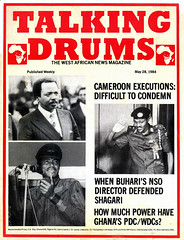Comment - Mr Botha Is Invited To Lunch
"We talk to the Russians, we are constantly being urged to talk even more frequently to the Russians, but that does not mean that we like communism or that we approve of communists".
It is easy to imagine the smirk playing just below the surface, as the lady throws that into the arena: "there, let's see how they cope with that, I bet they can't find an answer and that should shut them up for a while!"
Without getting into the absurdity of the "communism is the epitome of all evil" argument, it might be useful to point out that from the traditional African point of view, "clever" points, as Mrs Thatcher's now often repeated remark, are expected to be made by young and upcoming politicians trying to find elbow room and "wise" decisions are made by self-assured and confident statesmen.
There is an aura of "cleverness" and belligerence around Mrs Thatcher's defence of her invitation to Mr Botha that gives the impression that the lady is herself not totally convinced about the wisdom of her action but is determined to go through with it because nobody dictates to her.
But then nobody will presume to want to dictate to the Prime Minister of Her Majesty's Government. The questions that we ask are based on the very "virtues of being British" that Mrs Thatcher extols so eloquently regularly, "the fairness, freedom, determination in the face of adversity..." and we suggest that APARTHEID, which Mr Botha breathes, practises and preaches does not fit in with these "British virtues" and as persuasive as Mrs Thatcher undoubtedly is, we doubt that even she imagines that she can dissuade Mr Botha from his religion, over an afternoon's lunch.
The favourite argument that has been made by the South Africans themselves and their friends in advocating for the re-admission of South Africa into international sporting circles is that the regime has made such great advances since the ban that it deserves to be accorded some recognition for the efforts.
It is this very argument that must be used to bolster the case for the continued ostracism of South Africa from decent company, for it is only because of the ban that even these very feeble attempts at putting a "human face on apartheid" have taken place at all. The ban hurts and has been shown to be the only thing that affects South Africa, but it can hardly be said that a few mixed race rugby teams herald the collapse of apartheid as the political philosophy of South Africa.
It is reasonable to expect, however, that if maintained, the regime will have to accept and do something other than cosmetic efforts about the revulsion born by the international community towards it.
"Liberal" South Africans and their apologists in Britain have been arguing that even the modest reforms that have been achieved in the apartheid system are in danger of being lost as a result of a backlash from the extreme right-wing if those reforms are not seen to have achieved any concessions from the international community.
Since when have the British been known to give in to this type of blackmail. Where is the much vaunted sense of "utter and total revulsion" against such behaviour?
Mrs Thatcher has offered also that she extended the invitation to Mr Botha because he was going to be in the neighbourhood anyway and he was going to drop in or other people also. Again, where is that famous British determination to stand up against evil, alone and proud even when all the neighbours have succumbed?
Since when have the British, let alone Mrs Thatcher done anything simply because other people, let alone her European colleagues, have done so? The impression hitherto, had been that precisely because other people are doing something, Mrs Thatcher considers it a challenge to be different, even if only to demonstrate her resoluteness, so why make a difference with Mr Botha especially if the meeting is not supposed to signify an endorsement of his policies?
But the most pathetic excuse that has been offered is the one of justification in the light of the Nkomat agreement. Even Mozambique and Angola have now agreed to talk to South Africa, so why not Britain, Mrs Thatcher has argued?
Well, precisely because it is not British to give in to bullies of any sort. Mrs Thatcher is fond of quoting her most admired predecessor Winston Churchill. If he had decided to talk to and invite Mr Hitler in for a drink because even France, Holland, Poland etc, had now "agreed to talk to Nazi Germany" where would Britain's "finest hour" be today?
The fact of the matter is that like the wartime continent of Europe, Mozambique and Angola have been bombed and terrorised into submission, they had no choice, it was not even a question of "now agreeing to talk'. This is a clear case of the unarguable logic of the wrong end of the barrel and the two countries and others in the region have simply had as much as they can take.
It is less than dignified to use the miserable plight of these countries as a justification for giving the seal of approval to Mr Botha. For deny it or not, Mr Botha will take his invitation as such and at the end of the day, the message won't be lost on him: even the British will have the Bully in for lunch. Whatever Mrs Thatcher is hoping to achieve from her meeting with Mr Botha, we hope she will consider whether the advantage is worth the total dismay and revulsion her decision has caused among Africans.
